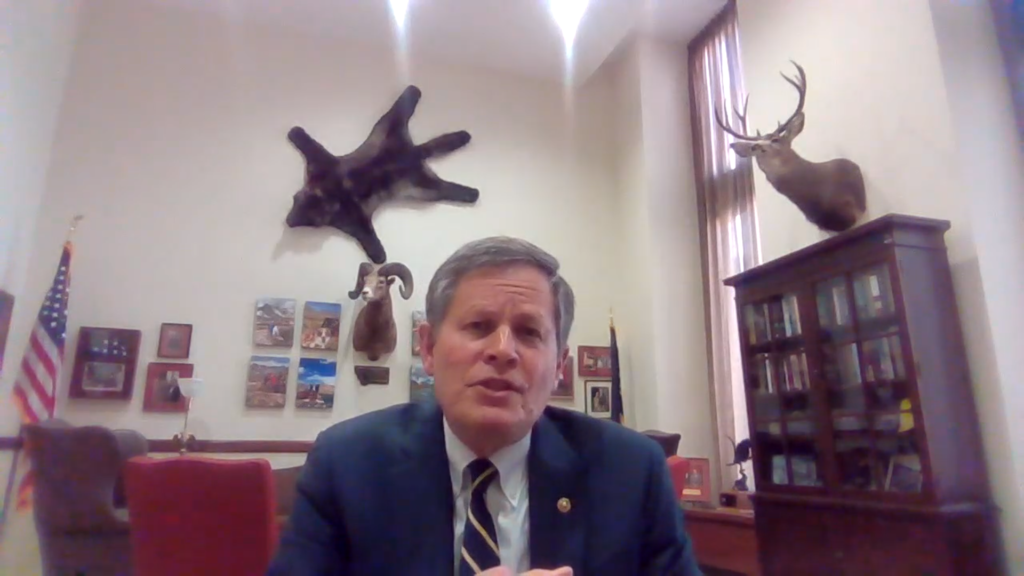S-CORP and NFIB hosted their Main Street Tax Day Summit yesterday — a two-hour virtual event focused exclusively on the tax policy issues facing small and individually- and family-owned businesses.
Sen. Steve Daines (R-MT), one of Main Street’s staunchest allies on Capitol Hill, kicked things off. Among other topics, the Senator shared his thoughts on the current legislative outlook, and emphasized the importance of preserving key provisions from the 2017 tax bill, notably the Section 199A deduction:
These businesses are the center of the equation for driving economic growth. The sad reality is that raising rates and eliminating the 199A deduction would hurt the very businesses who are looking to expand the most, grow the most, and increase wages the most. That’s what’s at stake here.
Attendees then heard from the first of two panels. Hosted by NFIB’s Courtney Titus Brooks, the first panel featured four business owners from across the country: Jeanne Bell of Westside Finishing Company (Holyoke, MA); Stephanie Camarillo of MOLLY MAID of Boise and the Treasure Valley (Meridian, ID); Steve Ferree of Mr. Rooter Plumbing Portland & Vancouver (Gladstone, OR); and Sandra Finch of Finch CPA Firm PLLC (Spring, TX).
The panelists reflected on how the changes in the 2017 tax law benefitted their business operations, often enabling them to invest more in their employees and capital than they otherwise would have.
During Q&A, Courtney asked Sandra Finch, an owner of a small accounting firm whose clients are also mostly small firms, how repeal of the Section 199A deduction and other tax hikes would affect her clients. Sandra shared this perspective:
I asked my clients how they use the deduction and I keep getting the same answer: they’re putting it back into the company, and into employees, and to grow. One said that eliminating the deduction would be the “final nail in the coffin for us” because they’ve struggled so much. They’d have to increase costs to customers, or hire less people, or pay people less…Without the deduction, I think a lot of business owners would kind of give up a little.
The second panel was hosted by Chris Smith, Executive Director of the Main Street Employers coalition. Panelist George Callas, a Managing Director at Steptoe, covered the myriad of policy risks facing Main Street business owners included in the Biden tax proposals – everything from elimination of the 199A deduction to higher estate tax levies – and the challenges they would present to firms. George cautioned that even though a recent legislative proposal called for raising taxes on C corporations only, a second package to be introduced in the near future would include tax hikes on pass-throughs.
Closing out the event was David Winston, founder of the Winston Group and one of DC’s most respected public opinion professionals. David focused on recent trends in voter data, including public perception of the Biden administration’s handling of the economic recovery, and of recent policy proposals. He also commented on the disconnect between voters’ support for higher taxes, and their belief of what a “fair” amount of tax is:
We recently posed this question: What is the highest percentage tax rate that any individual in the US should pay for all taxes? The answer was 24 percent. So when we’re talking about some of these tax rate proposals, we need to attach percentages.
The concept that some people are paying over 50 percent of their income, in terms of all the taxes, is something that the country just doesn’t embrace. Yes, they think the wealthy should be paying more, and more successful businesses should be paying more. But there’s also a reasonable cap to that…so this is a critical dynamic as you engage on this issue.
Bottom line: The threat posed by the Biden tax policies to Main Street businesses is very real, and groups like NFIB, S-Corp, and the Main Street Employers coalition need to get busy.
We’re grateful to all those who attended, and our participants for helping drive that point home.
If you weren’t able to join us live, click here for a recording of the Main Street Tax Day Summit.

